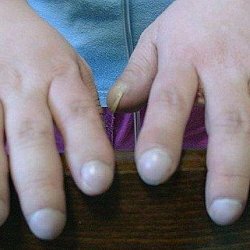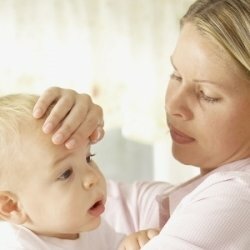Mucus in the feces of a child

Problems with stool in toddlers begin already from the moment of birth. It would seem that everything is normal, the child is calm, eats well, sleeps and normally croaks. However, when a child's chair at first glance may seem suspicious to her mother - she immediately beats the alarm. Slime in feces is found in almost every baby. Understand that the conversation is about mucus, you can by the form - it's light jelly or watery discharge. But as a rule, the allocation of mucus is generally considered normal if the child does not have particularly obvious symptoms of malaise. In this way, the baby's intestines protect themselves from alkali and acids. Getting into the large intestine, the mucus merges with the calves, it is completely invisible at the exit. And parents should worry about certain fragments of mucus, those that are clearly allocated in the child's stool.
What does mucus show in the feces of a child?
If mucus in feces is infrequent, there is a short time and the amount is not large, it is not very noticeable, then there is no need to worry. But when each emptying mates with mucus secretions, which, among other things, also has an unpleasant, pungent odor, and also has blood blotches, diarrhea arises, the baby cries, poorly gaining weight, restlessly asleep, these signs together with the mucus testify to the apparentProblem with the health of the child. However, in the absence of additional signs, the causes of mucus in the feces of a child may not be so serious.
Reasons for the appearance of mucus in the feces of a child
If the baby is breastfed, then, first of all, it is recommended to check for sterility its milk. For this, it is necessary to pass the appropriate tests. If experts in your milk find the cause of mucus in the feces of a child, then breastfeeding is not recommended to be stopped, but a specific special treatment is prescribed for you and your baby.
It is also recommended that mothers reconsider their food because of this malaise, because the cause of mucus in the feces of the baby can be a child allergy, intolerance to certain certain foods, for example, citrus fruits, bananas, milk, etc. Well, if the mother passes a blood test for allergy - MASTtest. Perhaps Mom should stick to a diet that excludes certain products that cause allergies.
Also, a loose stool with mucus in a child may appear as a result of complementary feeding. For example, this ailment may appear when introducing vegetable puree into the ration. In this case, you need to reduce the portion of puree in the diet and follow the reaction.
The stool with slime, which is clearly pronounced, first of all indicates a disease of the intestine. Therefore, it is necessary as soon as possible to seek help from a doctor and pass tests on the state of intestinal autoflora.
Also in the feces of a baby, mucus can get into a bronchitis or runny nose. In newborn babies, mucus is often formed in the stool due to transient dysbiosis.
Mucus in the feces of a baby can appear after taking some medical medicines.
Treatment of this ailment in a child
So, first you need to check your milk for your mother and then begin to examine the child. In case of a real problem, you should try to solve it as early as possible, so as not to delay, and not to aggravate the disease. In order to achieve the desired result, parents should always turn to a qualified specialist and pass all necessary tests( for dysbiosis, egg egg, scatology and carbohydrates, urine, blood, and others).
It will be a big mistake if the parents decide to independently determine the type of the disease and prescribe the medicine to the child on the advice of friends or neighbors. This can be done only by specialists, plus a preliminary laboratory test is required. Parents should take care that the baby is inspected by an experienced pediatrician. He will follow the development of the child all the time. Parents without attention should not leave changes in the state of the baby, because the causes of mucus in the stool can be the most serious diseases.



